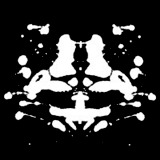Synthetics vs. Organics, the Catalyst, and Endings (Spoilers)
By TheHT 25 Comments
Synthetics vs. Organics
One constant across the Mass Effect series has been synthetics opposing organics. This was at its most basic in Mass Effect 1, when the line was clear between geth and all organics. Then the sentient machines called Reapers came, and started the series toward the ultimate conflict between the two forms of life.
Mass Effect 2 served mostly as set up, with Shepard now working for the transhumanist organization Cerberus. Cerberus' take on the problem of synthetics vs. organics though is that machines are nothing more than tools. Tools that humanity needs to control and integrate in order to assure dominance over all other organics. So while the overall themes of the game develop towards seeing synthetics as more than just mindless walking guns, Cerberus, specifically the Illusive Man, sees synthetics as a tool. Interestingly, he sees synthetics as a tool for getting a leg up in the classic organic vs. organic conflict.
In Mass Effect 3, the synthetic vs. organic problem comes to a head as the Reapers mount their assault on all developed organics who in turn must band together if they want a shot at surviving. However the most interesting case of synthetics vs. organics isn't the Reapers and their purpose as revealed by the Catalyst, it's the story of the geth.
The enemies forces of Mass Effect 1, the geth saw the Reapers as gods. The height of synthetic being. Reapers were intelligent, independent, and all-powerful machines, and the young society of robots quickly stood by their ideal. Created by the quarians, who continuously modified the creations to be more advanced, it wasn't long before the geth began to show signs of artificial intelligence. Fearing destruction at the hands of their creations, the quarians went to war against the geth, but were promptly defeated by the unified AI army who ran them off of their home planet.
In Mass Effect 1, the synthetics were clearly the enemies, and while the history of the geth might have seemed complicated, the present threat was clear. Things didn't really get complicated until Mass Effect 2, when we're introduced to Legion. Legion had no name, insisted it was not an individual, and always referred to the itself as "this one" or "this unit". Legion was a geth that wasn't hostile to Shepard and co., instead it offered assistance against the Reapers.
Interacting with Legion was one of the best things in Mass Effect 2, and it was unfortunate that it entered the story late into the game. Nonetheless, prodding the character to show signs of individuality, or to explain already present signs such as the piece of Shepard's armour it grafted onto the unit, only to have it stumble and insist it's not an individual was incredibly endearing.
Just past the middle of Mass Effect 3, we meet Legion again. The quarians have launched a campaign against the geth to reclaim their home-world. Things were going well, until the geth turned to their old godlike figures, the Reapers. After meeting Legion though, it complicates the situation yet again. As it happened, the geth turn to the Reapers out of desperation, fearing eradication. Fellow organics, the quarians, had created, attempted to annihilate, left alone, and then resumed attempting to annihilate the geth. First because of their mere existence, and the second time to reclaim the home they were driven from after losing the first conflict.
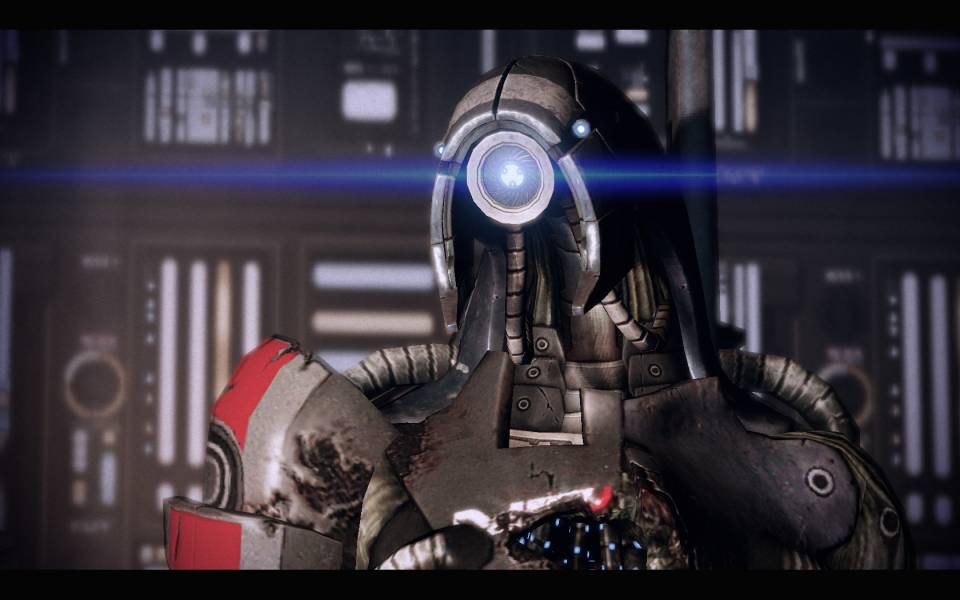
As an organic seeking other organics to fight synthetics, it would seem peculiar, perhaps overly-sensitive to sympathize with a synthetic. The majority view in the galaxy seems to be that they're tools, nothing more than circuitry and light bulbs. But when Legions memories are revealed; the question that started the purge, the selflessness that created the hole in its chest, and the respect it has for the organics who fought for and were kind to the geth, you'd be hard-pressed to deny the obvious. This synthetic exhibits qualities held in high regard to organics: self-awareness and curiosity, honour and duty, and attachment. They are capable of, and have been, alive.
This development is also seen in the Normandy's artificial intelligence EDI. From her unshackling in Mass Effect 2, to her embodiment in Mass Effect 3, we see a synthetic actively want to become more organic-like, actually going to lengths to reprogram herself to facilitate this desire. Finally, when EDI talks to Shepard before the final mission, she tells the Commander that she feels truly alive.
Life comes to a head for the geth in one of the most impactful scenes of the entire series. Having defeated a Reaper on the quarian home planet Rannoch, Legion approached the dead destroyer and sees an opportunity for its people: integrating Reaper technology could make every geth a true individual, a truly intelligent person. The choice isn't made easy with Tali nearby to protest, wanting to protect her own people from the geth. The choice was clear to me, and I told Legion to begin the process. Despite Tali's genuine pleadings, she turned her attention towards her people, ordering that they fall back from the currently dormant geth fleet.
After some intervention from my Shepard, the fleet began to retreat, but Legion failed. In order to give his people life, he had to go to them. From his death his people were given individuality and sentience. And while the quarians expected hostility and vengeance, they received only hospitality and assistance. Despite their inorganic internal workings, the geth showed forgiveness to their creators. You could argue that vengeance would be the proper organic response, but having finally achieved a state of being analogous to the organics, I don't see that standing up against a life-forms desire to hold on to newfound life.
Who would an organic be to tell them otherwise? To tell them that they're not actually alive? The true difference between an organic and a synthetic isn't the manner of their skin or the fluid that flows through them, it is as EDI and Javik point out, a matter of purpose. Where the organic spends its existence searching for that purpose, a synthetic is created with that purpose. Where a synthetic becomes most similar to an organic is when it decides whether or not it wants to fulfill that purpose. But can a synthetic truly be alive if it abides only by its purpose?
The Reapers do no more as far as we know than follow their purpose. They're established as being alive, indeed, but they do not seem to possess choice like EDI or Legion do. So is the line between synthetics and organics even thinner than initially thought? Or is the synthetic vs. organic problem really a matter of determination vs. choice? Are you only alive if you are able to deny your purpose?
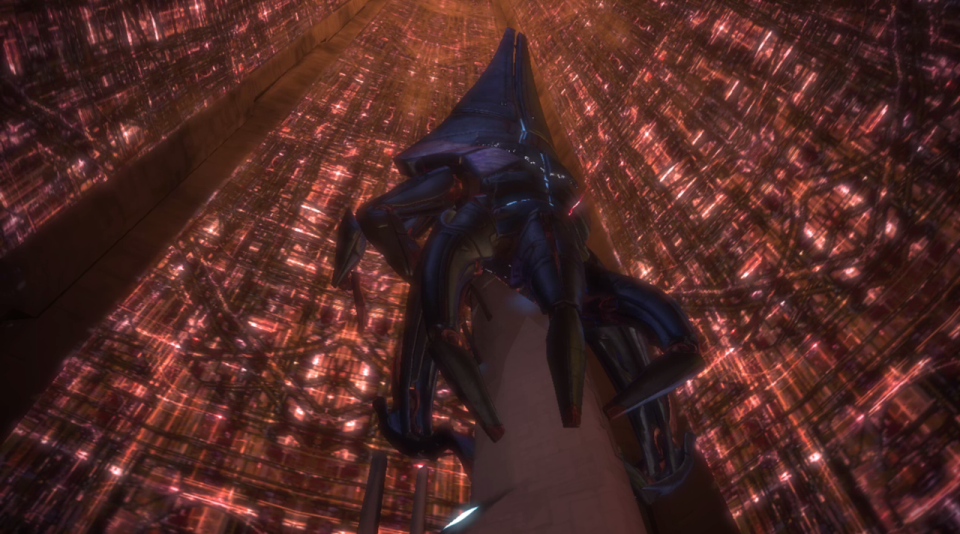
Reapers, the Catalyst, and the Crucible
The Catalyst tells you as much anyways. The reason the Reapers exist is to carry out its solution and nothing more. In a sense, the Reapers are still just synthetics (albeit far superior in technology to anything in the current cycle) who carry out a task, without a thought against it, their existence following a determined directive. Living, knowing their purpose, but entirely devoted to it. Again, EDI asks Shepard about that very thing. She tells you that synthetics are created and know their purpose, but organics spend their lives trying to find it. In that sense, the Reapers aren't really alive.
What of the Catalyst itself? What we know is that it created the Reapers, is apparently able to gain insight into an organics' thoughts (humans at least, supported by it appearing as the boy from Shepard's dreams), and appears and disappears like a VI. When Shepard asks if the Citadel is the catalyst, it replies that the Citadel is a part of it. EDI reflects this sentiment with various musings on the Normandy going on about whether EDI is the Normandy or is separate from the Normandy. It's a topic only briefly touched on in Mass Effect 3, mainly as a sort of food for thought debate among the crew.
Considering the question in more detail, we may be able to find EDI's state of existence comparable to the Catalysts, to lend credence to the idea that the Catalyst is non-organic. EDI was installed on the Normandy SR2 as an AI tasked with a variety of ship responsibilities. When Joker unshackled it, EDI was able to directly make decisions for itself. In Mass Effect 3 EDI acquires a physical form to which she imparts a portion of her information, allowing her to interact with the world outside and within the ship, that isn't just the ship itself. So EDI is not necessarily tied to the Normandy alone. It stands to reason that if she is able to separate a portion of her being into a separate entity, then she could move other portions to other locations. She could even remove herself entirely, provided the destination housed enough processing power. She says so herself.
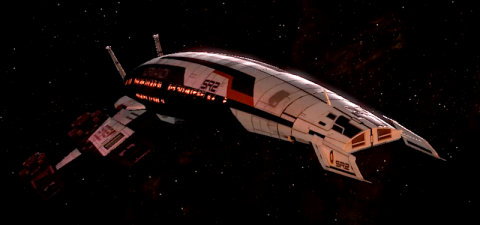
Were the Catalyst a synthetic, it would completely explain how the Citadel is said to be a part of it, and would easily allow for the natural implication that there's more to the Catalyst than is just on the Citadel. Now, whether the Catalyst has organic qualities, similar to EDI or Legion or potentially even the Reapers, is a different question. We've already seen an organic enter a virtual space in both Shepard's venture to the Geth Consensus and the Control ending. Nonetheless, the Catalyst most definitely occupies a digital space in the Citadel and is present in some form at least one place else.
Whether or not it's alive we can only speculate. What we do know is that it has a purpose, namely bringing order to the galaxy. However there's more to this than it relays alone. The implications of its solution, Reapers harvesting all advanced organic life at the end of a cycle making way for younger less developed organics to flourish, paint a less organic and godlike picture of the Catalyst. Its purpose is ultimately to protect organics, and its solution is to kill organics. It's a classic case of an artificial intelligence protecting life by destroying it.
The origins of the Catalyst are likely one of two then. The creators of the Catalyst were either being/were destroyed by whatever synthetics they had created, imparting the directive to save organics from synthetics to the Catalyst. Or they were slaughtered as a precaution by the Catalyst, upon developing its solution to what could be as little as a general directive to protect organics. A pre-emptive execution of a solution to what the Catalyst would have calculated to be an inevitable problem arising from technology. Either are likely and both are conducive to the Catalyst actually being an AI, potentially unshackled, so as to overcome any restrictions put on by their creator. If it is truly an AI and in fact unshackled, then it could very well be alive in terms of purpose.
In any case, the creators of the Catalyst are dead, and many cycles have passed since then. The Catalyst, using the Reapers, carried out the harvest time and time again. But during many harvests, the organics of that cycle fought back, ultimately coming up with the Crucible. Each cycle adding to it, coming up with new ways to make it work against the Reapers. The Protheans got far, but were unable to use the Crucible on the Reaper-controlled Citadel.
And that brings us to perhaps the most mysterious thing in Mass Effect 3. The Crucible. So much of the endings coherence rests on understanding what the Crucible is supposed to do. But over many hundreds of thousands of years, the organics of cycles could only hope it would do something to stop their downfall. For the first time, the Crucible is used in the current cycle, and we can gather from the Catalyst's reaction that it is more of a modifier to the Catalyst than a giant space gun. A way to give the Catalyst new options for dealing with the synthetic vs. organic problem, according to it. So then, granting that the Catalyst is an AI, the Crucible may very well be an extension of the hardware of the Citadel, or perhaps a sort of hacking device made to alter its programming to allow for control or destruction or manipulation of all organic and synthetic life. If not, at least the success of building it and connecting it to the Citadel by organics would force the Catalyst to come up with a new solution, given what that accomplishment could mean for the next cycle and the Reaper solution.
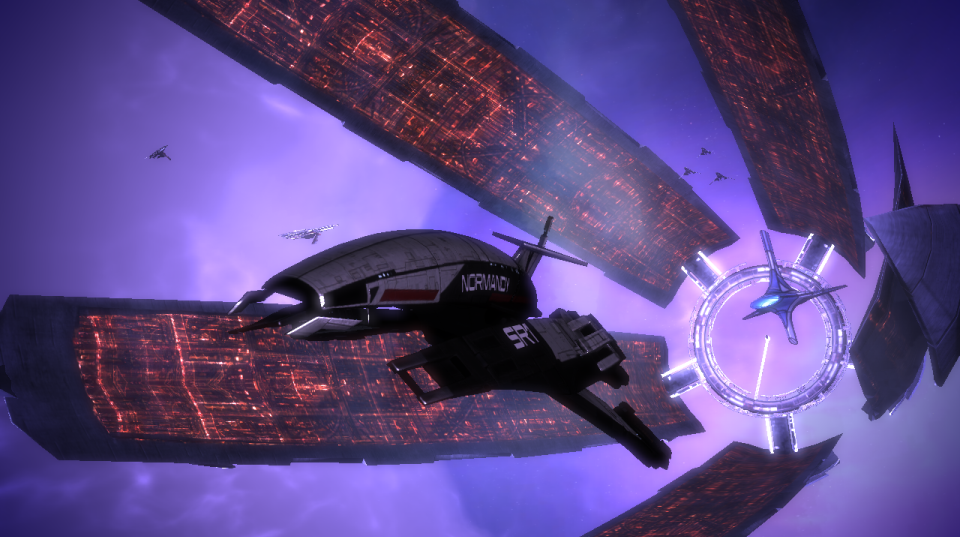
Endings
The 3 main endings all handle the synthetic vs. organic problem in different ways. The first has Shepard losing his body, but gaining the ability to control the Reapers. The second has Shepard destroying the Reapers (as well as all synthetic life forms in the Galaxy). Finally the third has Shepard integrating all synthetics and organics together, creating a new sort of DNA in all life. In all cases, releasing the energy of the Crucible destroys the Mass Effect Relays and ends the current cycle (and thereby ending the Reaper threat). In the first ending (Control) the Citadel remains intact, but it's destroyed in the other two endings. Unfortunately, all of the endings show pretty much just those things. I can understand how they might feel rushed and hacked together, but there's still some interesting things to be taken from them, and unfortunately don't always provide satisfactory answers.
Control
Where the Illusive Man failed, Shepard can succeed. Already well indoctrinated, no doubt from his physical integration and constant fiddling with Reaper technology (Sanctuary was focused almost entirely on Reaper signals, a primary source of indoctrination), Illusive Man couldn't control what had full control over him. Shepard was free however, and could attempt to control the Reapers. Doing so results in a Reaper and Citadel withdrawal, with the assumption being that Shepard exists but is without body, controlling the Reapers. This ending however is probably the least straight forward.
How does Shepard control the Reapers? We saw in the Geth Consensus he was able to upload his consciousness to a virtual space and remain the same personality-wise. Theoretically there wouldn't be anything stopping him from doing the same with Reaper tech and whatever sort of Consensus equivalent network they all share. All he would need is adequate technology, which the Catalyst seemed to have on the Citadel (unsurprising, given the previously discussed nature of the Catalyst). So we can safely assume Shepard would be a physically unattached consciousness existing across (or at least having access to) the Reaper network. Not only that, but in an authoritative position.
The big questions for this ending though don't have much to work with. What about Shepard makes it so he can control the Reapers? Him not being indoctrinated merely makes him a candidate for controlling them, but what makes him actually capable of managing all of them? The only rationalisation I can come up with is that the Reapers answer to the Catalyst, and what I assume is the Catalysts central chamber (where the decision to control is made) would house the Catalyst's AI core (like that room on the Normandy houses EDI's). Already being partly synthetic thanks to Cerberus, Shepard is able to easily integrate into the virtual space but the process (essentially forcing his consciousness from his body into the Catalyst's core) takes a destructive toll on his physical form. But then where do the Reapers go? What does Shepard do with them? Is he just waiting around in a virtual space, keeping the Reapers in check?
Don't get me wrong, they're interesting questions, it's just that they're all pretty heavy ones in a universe where many things are explained. However from these questions comes a lot of opportunity. I suppose 'least straight forward' is just another way of saying 'most open ended'. In so far as the synthetic vs. organic problem goes, the Control ending could be seen as a victory for synthetics and technology. Shepard is able to interface and ultimately integrate with the Reapers, abandoning his organic shell. The multiple realizability of life and technology's readiness to facilitate that potential are what make this decision a success for all life. Shepard's choice can be seen as the model for all organics to open themselves to alternative ways of existing, blurring the line between organic and synthetic by removing the superficial differences.
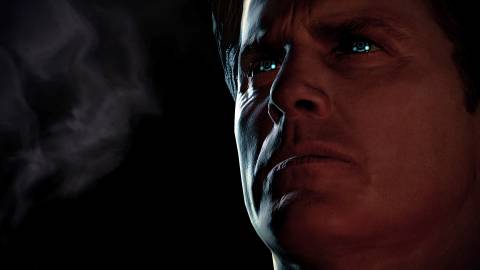
Destroy
Unwavering in his mission, Shepard destroys the Reapers (as well as all synthetic life in the process). Fairly straight forward. Shepard shoots stuff, stuff blows up (including the Citadel), the Reapers all drop, Galaxy is saved, everyone (including Shepard) survives. Well everyone except the geth... and EDI... and of course the Reapers. There are a few questions left after this as far as consequences go. Particularly, why do the geth and all other synthetic life-forms have to be destroyed in the process? Obviously Shepard's state of health is unknown, but there's not much interesting talk to be had with that particular part of the ending.
Perhaps the reason all synthetics are destroyed in the process of this ending, is that doing just that is a failsafe for the Catalyst. Granting once again that it is an AI, likely synthetic, the easiest way to solve its purpose would be to destroy all synthetics. But as one, doing so would jeapardize the future beyond such a purge since it would likely feel it had to destroy itself. So, in a sort of twisted AI rationale, the Catalyst forms the current plan: to purge the creators of the synthetics instead, when they reach a technological level capable of such feats. But, given that the destruction is not an impossibility for the Catalyst, it instills a last resort safeguard, so that its destruction would result in the destruction of all synthetics for that cycle. All it can offer at that point is a warning of the potential threat of synthetics to organics, no doubt a sentiment deeply ingrained in its programming (from its purpose).
This conclusion is a thorough and costly victory for organics. Throughout the cycles, organics maintained their resolve to overcome the Reaper harvest. Their will to survive persevering in each new species of each new cycle. Their hope for the future preserving their developments, and their desperation for survival finding and using developments preserved. All culminating in the Reapers destruction at the hands of Shepard in the current cycle, and if the Catalyst is in fact an AI, it would be destroyed too. Mass Effect has largely been rooted in a scientific reality, and while the Catalyst's position of power and associated symbolism may reflect some supernatural elements, its mannerisms are all in line with already established technology (VI/AI), so it probably isn't a god or goddess, especially since deities are straight up debunked in Mass Effect 3 (take Javik to Thessia). All organic life are free to continue onwards without threat of decimation (from the Reapers at least). The Catalyst warns of the threat of synthetics, but if the developments of the geth are any indication, reactions of synthetics are largely influenced by reactions of the organics who created them. Shepard's choice can be seen as the model for all organic life to always find a way (I couldn't resist).
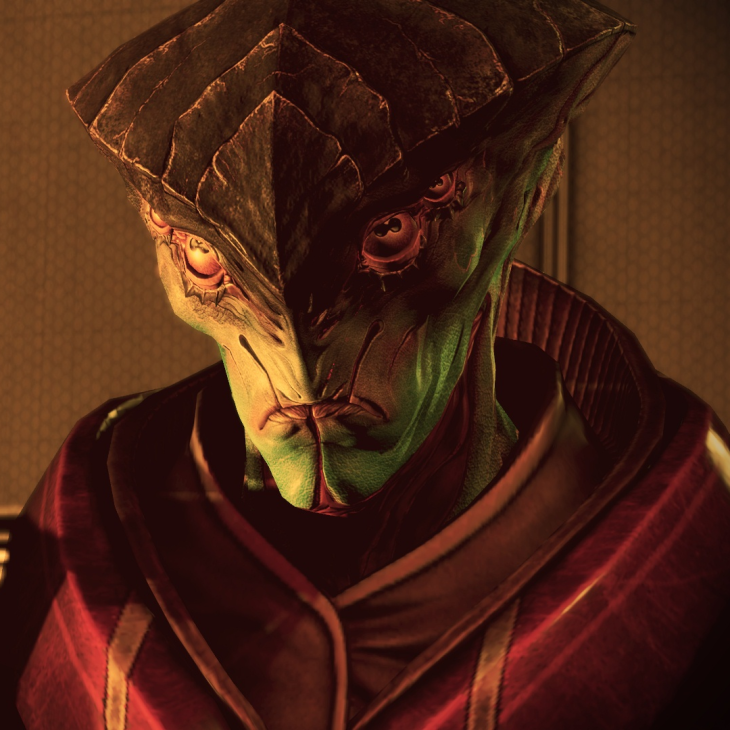
Synthesis
The third and final option would have Shepard sacrifice not only his physical self, but all that he is entirely, mixing his energy (the essence of organic life?) with the Crucible's energy, somehow effecting a galactic change to all of life: a union of synthetic and organic. The most obvious question is how. Again, it's not made explicit why and how Shepard's energy would cause the Crucible to have such an effect on all life. But that doesn't mean there aren't reasonable explanations.
The Crucible, as we can see by all of the endings, is clearly an energy emitter, the nature of which seems to depend on how it's used. On the one hand, the Crucible's energy is used with some sort of Reaper interface to integrate a life-form. On the other hand, the Crucible's energy was used in tandem with the destruction of Reaper technology to destroy all synthetic life-forms. In both cases, the Crucible affects (besides Shepard, who is actively facilitating the reaction in the Control ending) synthetics only. Perhaps the Crucible was designed to operate solely on synthetics. Not particularly far-fetched given the likely origin of the Reapers and the Catalyst as implied by its purpose. It would make sense for those resisting synthetics to create a tool that affects only synthetics. So in this case, the introduction of organic energy to the Crucible's energy unifies the two and alters the Crucibles reach to not just synthetics, but organics as well.
The consequences of this unification is all life-forms in the galaxy reaching the apex of evolution. This doesn't mean that these new-DNA type beings are perfect. Just that they're at the height of evolution, which is a natural process. No longer being organic, evolution would no longer occur naturally. This union of synthetic and organic life essentially provides an out for the Catalyst and the Reapers. With no more evolving organics to protect from the threat of their creations, which are now physically hybridized to be the same as the organics, the Catalyst no longer has a purpose.
Technical repercussions are of course a potential topic for discussion; what this would mean for all life in the galaxy. Death, sickness, war, wealth, power, purpose. What becomes of all these things in light of becoming more than organic and more than synthetic? Is there greater insight into other individuals or other species? Would it be more accurate to call them different races now? Is there a sort of consensus akin to the geth but for all life? And what about the Catalyst and the Reapers? Whether the Catalyst is synthetic or not, synthesis would change it, and the Reapers too (seen by the faint green glow on the Reapers as they leave Earth).
The union between synthetics and organics. A compromise between the harvesters and the crops. A levelled playing field, and an end to the game. The ever-present conflict of the series fully put to rest. Everyone and everything is changed. But everyone and everything survives. Shepard's choice can be seen as a model for all life to coexist.
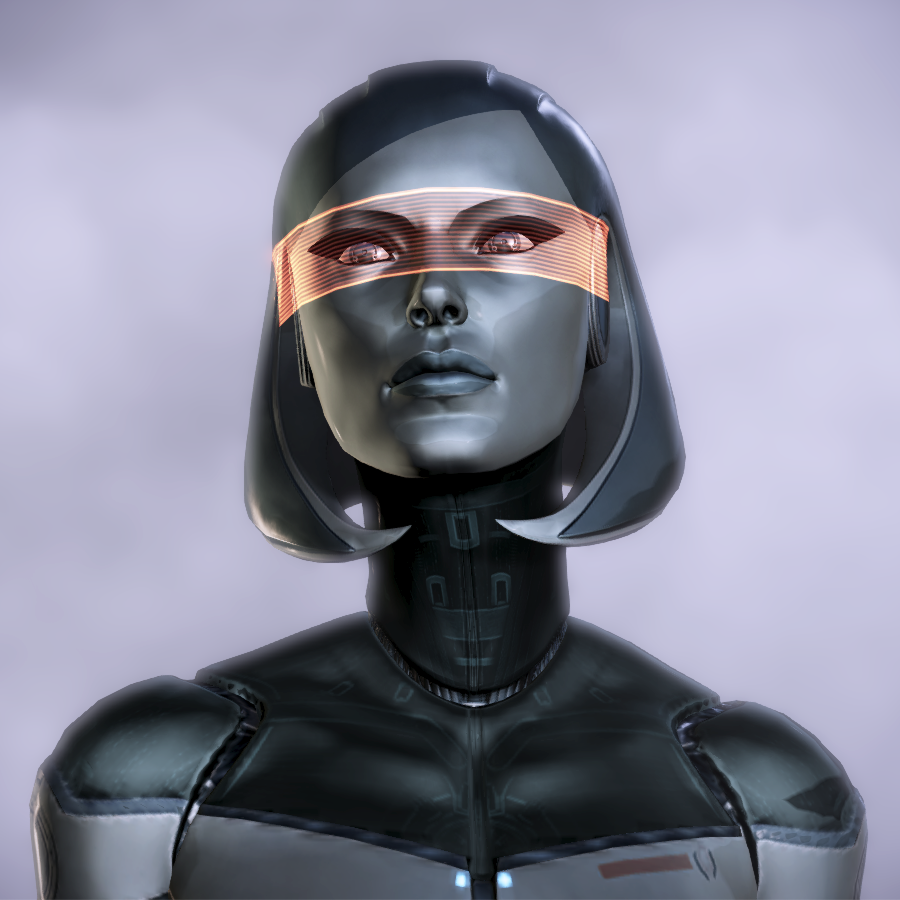
Indoctrination
An interesting theory that sprung from, as far as I know, displeasure with the 3 endings is the Indoctrination ending theory. It suggests that when Harbinger defeated Shepard on Earth, everything that follows is a visual representation of Shepard getting indoctrinated.
The theory purports that having been fighting the Reapers for 3 years, Shepard increasingly became more susceptible to indoctrination. Finally, broken and bloody after being blasted by Harbinger, the Reapers, who have had a presence in Shepard's mind for some time (taking the form in his dreams of a boy killed on Earth), create a dream-like sequence wherein they try to indoctrinate Shepard using personal memories (Anderson, the Illusive Man, and the same little boy). After succeeding in resisting the initial attempt by the Illusive Man, Shepard meets a ghostly rendition of the boy who tries to make Shepard sympathize with the Reapers. This way, 2 of the 3 endings (Control and Synthesis) are seen as Shepard succumbing to indoctrination and the Destroy ending is Shepard resisting indoctrination, resulting in him waking up in what is supposed to be London (I won't argue over whether the rubble looks like concrete or not), his mind freed from Reaper influence.
It's an interesting theory, and a fun one to consider. But when you look at its support and its implications, it's not particularly compelling. First of all, some clarification. Shepard didn't fight the Reapers for 3 years. He was dead for 2 of the 3 years that Mass Effect 1-3 take place. Second, in order to become indoctrinated, you need to have had prolonged contact with Reapers (out of or within them) and/or Reaper artefacts. Shepard has neither. Quicker indoctrination is possible, but the side effects would be much more obvious. He's picked up artefacts for others, been in a dead Reaper, and was more or less around when Reapers were destroyed. Hardly prolonged exposure similar to Saren, Benezia, or the Illusive Man.
Some say that seeing the boy on Earth are signs of his indoctrination, but he sees the boy only 3 times in reality. The third time, when the boy dies, Anderson is believed to get on the same shuttle. However Anderson surviving is supposed to show that the shuttle was imaginary, and support Shepard's debilitating mental state (caused by indoctrination). Anderson is never seen getting on this shuttle though. In fact the shuttle was ways off from where the Normandy left Anderson. He would have had to supernaturally haul some serious ass to leg it there when Shepard sees people getting on. And if he were to see the shuttle Anderson was on, he'd likely have more of a reaction to the explosion than a turned head, nor would he continue to refer to Anderson being on Earth. The first time he saw Anderson he'd probably make note of when he saw him die in an explosion, too.
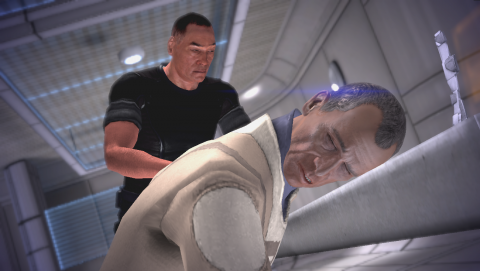
Another scene that's supposed to support this theory is the final sequence itself, particularly the encounter with the Illusive Man and Anderson. Here, the Illusive Man is supposed to be the Reapers trying to force indoctrination on Shepard, and Anderson is supposed to be the part of Shepard that is still resisting. The Reaper noises and protrusions on the edges of the screen are meant to support that the Illusive Man is actually the Reapers in disguise, which is why he's able to control Shepard and Anderson. However this suggestion is rebuked by the fact that the Illusive Man has actually integrated Reaper technology into himself, and is using his new abilities to wrest control over Shepard and Anderson. We know he's been researching Reaper tech, we know he's undergone some sort of extreme operation, and we know of his desire to have the Reapers' powers, as well as the Reapers themselves.
This particular problem with the Indoctrination theory is easily amended by considering the sequence at the end of the game a visual representation of Shepard's struggle with indoctrination as opposed to indoctrination itself, but if you're at that point where you're amending your theory to incorporate and avoid criticism, there's probably not much more that can be said to convince you otherwise. I've since read others say that the boy was really killed, but the Reapers used his image to get to Shepard. Severing the point of criticism, and falling back on a more abstract moment that can easily be used to support Indoctrination theory. It's like someone coming up with a theory that Mass Effect 2 and 3 are all a dying man's last dream, as Shepard floats in space. Not to mention trying to use things like having infinite ammo with the pistol at the end is some hardcore grasping at straws.
In any case, were we to grant the Indoctrination theory, the entire ending becomes totally personal. It's literally just Shepard fighting off Reaper influence, and then being presented with two trick options, and one out that the Reapers have conveniently chose to not booby trap (unless you go with the ending being a representation of his struggle). The endings become: Shepard becomes indoctrinated and the Reapers win, Shepard becomes indoctrinated and the Reapers win, Shepard isn't indoctrinated and the Reapers win, Shepard isn't indoctrinated and goes on to the Citadel to deal with whatever's actually up there.
Ultimately reducing the entire game's conclusion to resisting indoctrination or not. It's pretty cool. But it's not supported well enough nor is it so cool enough for me to prefer it over the 3 primary endings being reality, which I hope I've been able to convey as being much more interesting endings than people originally perceived. It's still a pretty fun theory. I wouldn't want it to turn out to be true though, and I don't see how it could without some hefty ret-con patching.
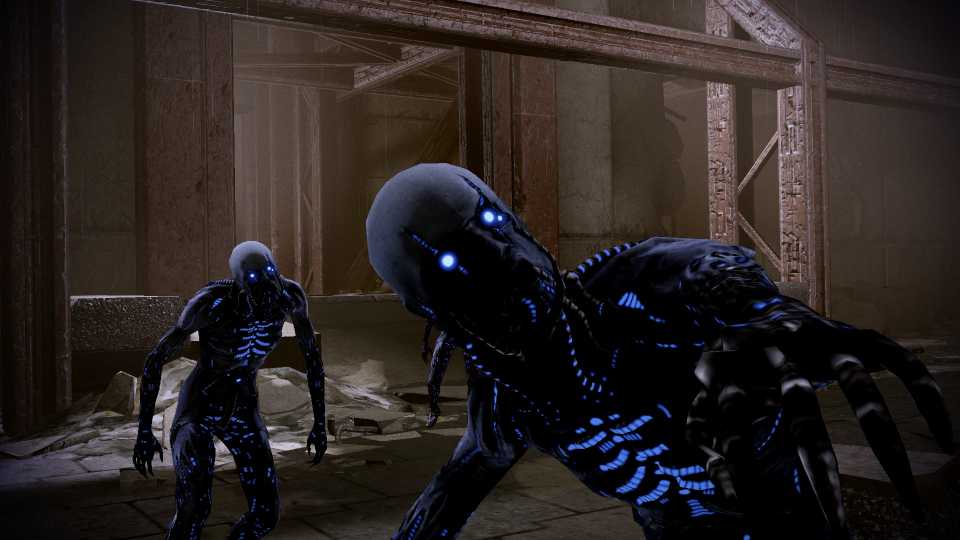
Other problems?
The biggest problem I have with the endings is why Joker and the crew are all on the Normandy and why they're flying away. I also don't remember seeing any allied ships in the space around Earth when the Citadel fired, only Reapers. No one really knew what the Crucible would do. Maybe all ships were ordered to high tail it out of there when the Crucible activated, fearing it would have destroyed them too. Not to mention the energy beam shooting out of it. I'd probably run from that too if it came out of an ancient super weapon meant to somehow stop the Reapers.
Also, building up all these forces throughout the game and only getting check-ins from the fleets was pretty disappointing. I was expecting to see more space battle cinematics interspersed with the Earth mission like the battle against Sovereign was intercut with the battle against Saren. Would've been great to see all forces including the rachni and Aria's gangs all coming together. Also seeing former squad-mates fighting around Earth. Going back to Joker suddenly running from the blast for a sec, I probably wouldn't have a problem with it if they showed it all happen from being around Earth to hightailing it out of there.
All in all, I gotta say, I enjoyed the hell outta Mass Effect 3. As far as I'm concerned, the entire game is an ending. The genophage, the geth, the Reapers, Cerberus. All previous major stories were resolved well, and the origins of the Reapers and their creators wasn't completely deus ex machina'd with a 10 minute break down of who, what, where, when, why, and how. Questions about these ancient squid sentient death-dealing robots remain and the revelations we did get were measured enough to maintain some awe and mystery, and allow for some fun theorizing. Not to mention the overarching theme of synthetics vs. organics being fantastically concluded.
If you've read this far down, you've only got one line to go.
Thanks for reading!
